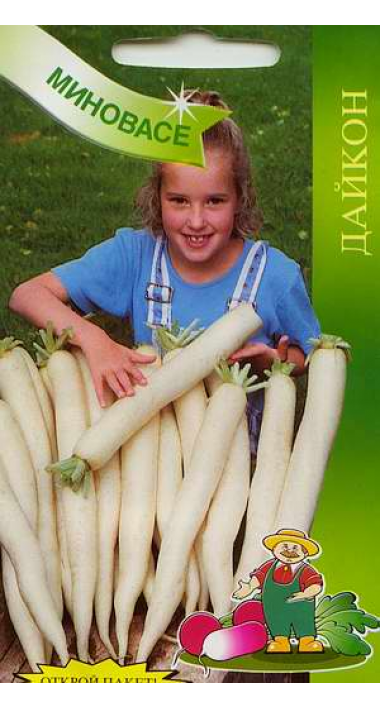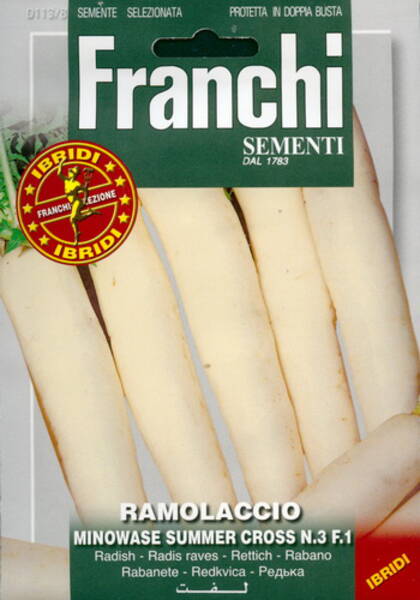Ex Tax: 2.45€
Dietary product. Does not contain mustard oils.
Mid-season hybrid variety: from germination to technical maturity 50–60 days. Root crops 40-45 cm long, 3/4 buried in the soil.
Root crops are pure white, cylindrical in the upper part, elongated-conical in the lower part, 3/4 buried in the soil. Length 40-45 cm, diameter - 7-9 cm.
The pulp is dense, crispy, very juicy. The taste qualities are excellent. Heat resistant, disease resistant. The grade is heat-resistant, steady against diseases.
Grows well in loose soil. Used fresh.
Cultivation: daikon is an unpretentious plant and can grow on various types of soil, but gives the highest yield on light fertile soils with deep groundwater.
In autumn or early spring, humus or compost (1 kg / m²) and mineral fertilizers are applied to the site: 20 g of ammonium sulfate, 40 g / m² of superphosphate and 20 g of potassium sulfate per 1 m2.
The best sowing time is the second half of July. In this case, it is possible to avoid the flowering of plants.
Seeds are sown on ridges 140 s wide in two rows, the sowing pattern is 50-60x25-40 cm. On heavy soils, small narrow ridges are made and plants are sown in one row.
To obtain uniform seedlings, the grooves are slightly compacted before sowing the seeds, and after sowing they are mulched with peat or loose soil with a layer of 1.5-2 cm.
Seeds are sown in small holes. Shoots appear on the 3-5th day.
In the stage of two or three true leaves, the plants are thinned out, removing weak seedlings with scissors and trying not to damage the remaining plants.
Before sowing, the bed is well watered. In the future, watering is done as needed. On the beds, weeds are removed, row spacing is loosened.
Regular watering and dusting with ash help prevent crops from being damaged by a cruciferous flea.
Root crops are harvested in dry weather, the tops are cut off from them and folded for storage in boxes with sand or in plastic bags with holes.

Eng.: Oriental Radish.
Nutritional value of daikon.
Oriental radish (Daikon) contains vitamins C and B, fibre, pectin. It contains a lot of potassium salts that remove excess fluid from the body, and daikon also contains enzymes that promote digestion and substances that inhibit the growth of harmful bacteria.
Of the vegetables, only radish, daikon and horseradish are able to cleanse the liver and kidneys, including dissolving stones.
However, radish and horseradish contain a lot of mustard oil, which has a stimulating effect on the heart, so they are not recommended for the elderly.
But the daikon practically does not contain these oils.
Oriental radish is useful for colds, for strengthening hair, for the proper functioning of the intestines, for diseases of the gallbladder, liver and kidneys.
Daikon retains its juiciness and good taste even after the transition to the stalking phase, because. its tissues are not lignified.















